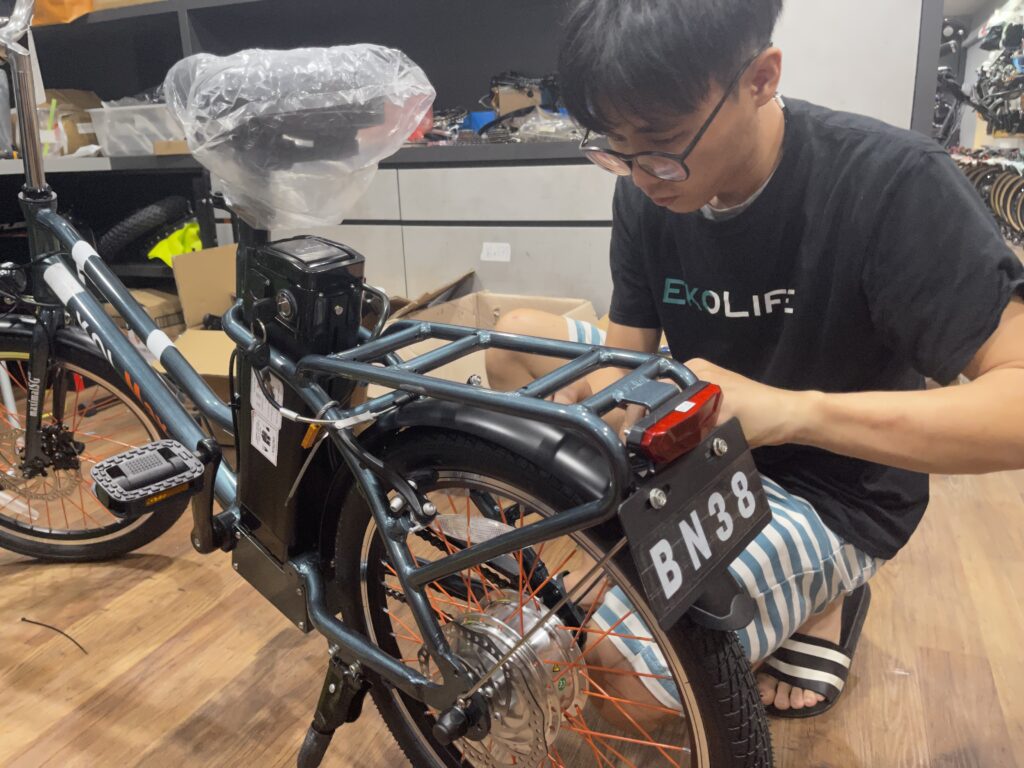Table of Contents
As the popularity of ebikes continues to soar, many riders are exploring whether they can take on the challenge of DIY ebike repair. From adjusting brakes and chains to replacing tires and inner tubes, there are indeed several basic mechanical issues that you can tackle on your own. However, when it comes to electrical components like the battery or motor, the risks associated with DIY repairs become significant, especially in light of Singapore’s LTA regulations.
Improper repairs may not only void warranties but could also render your ebike non-compliant. In this blog, we’ll delve into the dos and don’ts of DIY ebike maintenance, so you can keep your ride in top shape while ensuring safety and compliance.

Understanding Basic Ebike Maintenance
When it comes to maintaining your ebike, understanding basic maintenance tasks is essential for every rider. Simple mechanical issues such as adjusting brakes or chains, replacing tires or inner tubes, and tightening bolts or adjusting the seat and handlebar can be handled effectively by you.
These are manageable tasks that often require minimal tools and some time, making them perfect for the DIY ebike repair enthusiast. This approach not only saves you money but also empowers you with a better understanding of your ebike’s mechanics. Regular routine checks and ebike repairs can ensure your ebike runs smoothly and enhances your riding experience.
Common Mechanical Issues You Can Fix Yourself
When it comes to DIY ebike repair, many riders can confidently tackle basic mechanical issues without professional help. Common problems like adjusting brakes or chains, replacing tires or inner tubes, and tightening bolts or adjusting the seat and handlebar can often be addressed with minimal tools and expertise. Most of these tasks enhance your riding experience and ensure your ebike operates efficiently. As long as you’re following the manufacturer’s guidelines, these simple fixes can save you time and money while making you feel more connected to your ride.
However, it’s important to remember that while minor mechanical issues can be handled at home, electrical components such as the battery, motor, controller, or wiring are best left to professionals. Attempting to fix these without the right skills can not only void your warranty but may also lead to significant safety risks. In Singapore, where LTA regulations require ebikes to remain compliant and unmodified, undertaking electrical repairs can make your ebike illegal to ride. Therefore, focus on what you can do yourself and reach out to specialized repair services for more complicated issues to ensure your ebike is safe and ready for the road.

When to Seek Professional Help for Ebike Repairs
While some ebike repairs can be handled at home, knowing when to seek professional help is crucial for ensuring both safety and compliance. Basic mechanical adjustments, such as tightening bolts, replacing tires, or adjusting brakes and chains, can often be tackled by enthusiastic DIYers. However, areas involving electrical components—like the battery, motor, or wiring—should typically be left to professionals.
In Singapore, the LTA’s regulations mandate that ebikes remain LTA-approved and unmodified, making it essential for riders to understand that DIY fixes could potentially void warranties or make the bike non-compliant if not executed precisely right. Additionally, certain risks are inherent in DIY electrical work, which can lead to serious issues like battery short circuits or unsafe operation of the motor. For riders who encounter problems beyond simple maintenance, visiting trusted shops like Eko Life is advisable.
These professionals not only provide diagnostic services but also ensure that customers receive the proper parts and repairs without jeopardising their safety or warranty. This approach to ebike repair is beneficial in the long run, as trained experts can diagnose complicated issues that may arise, keeping your ride safe and compliant with local regulations.
The Risks of DIY Electrical Repairs on Ebikes
When it comes to DIY ebike repair, many riders may feel confident tackling mechanical issues such as adjusting brakes, tightening bolts, or replacing tires. However, the risks associated with DIY electrical repairs are starkly different. Electrical components like the motor, battery, and controller are complex and can become dangerous if tampered with improperly.
For instance, attempting to repair or replace these parts without the right tools and knowledge could lead to serious problems such as battery short circuits or fires, which pose a significant safety risk both to the rider and others on the road. Moreover, any DIY electrical work could void your warranty, which is an important consideration for those whose ebikes are still covered. Another critical factor to consider is compliance with Singapore’s LTA regulations, which require ebikes to remain unmodified and LTA-approved.
Any improper DIY fixes may lead to your ebike becoming non-compliant, potentially making it illegal to ride. Professional servicing from reliable shops like Eko Life is often the safest and most cost-effective route for major repairs, particularly for electrical components. By allowing the trained specialists to handle electrical diagnostics and repairs, you not only mitigate risks but also ensure that your ebike continues to meet essential safety and legal standards.
LTA Regulations and DIY Modifications Explained
When it comes to DIY repairs on your ebike, it’s crucial to understand Singapore’s Land Transport Authority (LTA) regulations. These rules mandate that ebikes must remain LTA-approved and unmodified for compliance. Attempting DIY modifications or repairs, especially on electrical components like the battery or motor, could potentially render your bike non-compliant.
This could not only result in hefty fines but might also make your bike illegal to ride on public roads, exposing you to legal liabilities. Major electrical fixes should ideally be left to professionals who are familiar with these regulations to ensure both compliance and safety. Furthermore, engaging in DIY repairs, particularly on electronic parts, can lead to serious risks such as voiding your warranty or causing hazardous situations, including battery short circuits or unsafe braking.
For instance, improper tinkering with the speed limiter or controller can lead to severe performance issues or even accidents. Shops like Eko Life are equipped to handle these repairs professionally and can even provide diagnostic services, ensuring your ebike remains safe and compliant. Ultimately, understanding the balance between DIY maintenance and professional support is essential for every ebike owner.
Essential Tools for DIY Ebike Maintenance
When it comes to DIY ebike maintenance, having the right tools at your disposal is crucial for ensuring effective and safe repairs. Basic tools like a multi-tool with tire levers, wrenches, and a pump are essential for simple tasks such as adjusting brakes, changing tires, or tightening bolts on your components. Additionally, investing in a quality torque wrench can help you apply the correct tension to parts like the seat and handlebar, promoting safety and functionality on your rides.
Having a stand to hold your ebike while you work can make the maintenance process much more convenient as well. However, while basic maintenance tools are important, it’s vital to understand that working with electrical components requires specific equipment and knowledge. Multimeters and soldering tools may be necessary for diagnosing issues with the battery or wiring.
Remember, attempting to repair or modify electrical components without the proper tools or expertise can lead to significant safety risks, including voiding your warranty or damaging the ebike. Therefore, focus on minor repairs while considering professional assistance for more complex tasks, especially for LTA-approved ebikes in Singapore. This way, you can maintain your ebike efficiently while ensuring compliance with regulations and safety for your rides.
Best Practices for Safe Ebike Repairs
When it comes to ebike repair, it’s crucial to follow best practices to ensure your safety and the longevity of your bike. For basic mechanical issues like adjusting brakes, chains, or replacing tires, many riders confidently take on these tasks themselves. However, always keep in mind that for any repair, you should refer to the manufacturer’s repair manual and stick to using original replacement parts.
This ensures that any adjustments made are in line with the manufacturer’s guidelines, keeping your ebike compliant with Singapore’s LTA regulations, which are strict about modifications. Improper DIY repairs could make your ebike illegal to ride and void your warranty altogether. On the other hand, when it comes to electric components such as the battery, motor or wiring, it’s best to leave it to professionals.
DIY electrical work can lead to risks such as short circuits or even fires. Shops like Eko Life provide diagnostic services and replacement parts, ensuring your ebike remains safe and compliant. If you’re not comfortable with more complex repairs, don’t hesitate to seek professional help, especially when dealing with LTA-approved ebikes. This not only saves you potential headaches later on but also secures your investment in the long run.
How Professional Services Can Save You Time and Money
While the allure of DIY ebike repair can be strong, especially for minor mechanical issues like adjusting brakes or replacing tires, engaging professional services can ultimately save you both time and money. Specialists have the proper tools and experience to quickly diagnose problems that might take an amateur much longer to identify.
They can also ensure that any repairs comply with Singapore’s LTA regulations, maintaining the bike’s legality and safety. By leaving electrical repairs and diagnostics to trained technicians, you prevent the risk of voiding warranties or inadvertently causing more damage to your ebike that could lead to costly fixes down the road. Moreover, professional shops like Eko Life not only offer expertise but also provide convenient services such as pickup and delivery if you’re unable to take your ebike in for repairs.
This adds to the overall value of opting for a professional ebike repair service, as it alleviates the stress of transport and gives you peace of mind. They also have access to original replacement parts and can ensure your ebike is functioning at peak performance, saving you from the frustration of future issues. In the long run, investing in professional servicing may very well prevent future headaches and ensure a smoother riding experience.
Final Thoughts on DIY Ebike Repair
In conclusion, while minor ebike repair tasks such as adjusting brakes, replacing tires, and tightening bolts can be managed by those with basic mechanical skills, it’s crucial to recognize the limitations of DIY repairs. Electrical components require a deeper understanding of both the technology and the regulatory implications in Singapore.
Attempting to repair these parts on your own can not only void warranties but also pose serious safety risks, including potential battery fires and equipment failure. Therefore, it is advisable to consult professionals for any electrical issues to maintain both your safety and the legality of your ebike. Additionally, partnering with reputable service providers like Eko Life can ease the burden of maintenance by offering expert diagnostics and repairs.
They are familiar with LTA regulations and ensure that your ebike remains compliant while also enhancing its reliability and performance. By understanding your capabilities and knowing when to seek help, you can enjoy a safer and more fulfilling ebiking experience without compromising on quality or safety.

Safety first! The article’s advice on not DIY electrical repairs is spot on. I’d rather pay a bit more for reputable service providers like Eko Life than risk compromising ebike safety.
Hello Kieran, thank you for sharing your thoughts on our article ‘DIY Ebike Repair: What You Seriously Desperately Need to Know 2025’. We appreciate your commitment to ebike safety and your trust in Eko Life’s services. For any future ebike-related concerns or queries, please don’t hesitate to reach out to us via [email protected] or +65 6589 8877.
What about for non-electric bikes? Are there any specific maintenance tips for traditional bicycles? I’d love to see a follow-up post on that.
Hi Leah, thank you for sharing your thoughts on traditional bicycle maintenance! While our blog post focused on DIY ebike repair, we recognize that basic maintenance tips are applicable to both electric and non-electric bikes. We’ll definitely consider creating a follow-up post on maintenance tips for traditional bicycles, covering tasks like adjusting derailleurs, checking tire pressure, and lubricating chains. In the meantime, our Eko Life service centers offer comprehensive bike checks for traditional bikes. If you’d like to schedule a bike check, feel free to contact us at [email protected] or +65 6589 8877. Keep pedaling safely!
I agree that DIY ebike repairs can be a cost-effective option, but understanding the risks and knowing when to seek professional help is crucial. Thanks for highlighting the importance of ebike maintenance!
Hi Shawna, thank you for your thoughtful comment! We completely agree that knowing when to seek professional help is crucial when it comes to ebike maintenance. At Eko Life, we’re committed to helping our customers understand ebike basics while ensuring their safety on the road. If you have any further questions or concerns, please feel free to reach out to us at [email protected] or call us at +65 6589 8877.